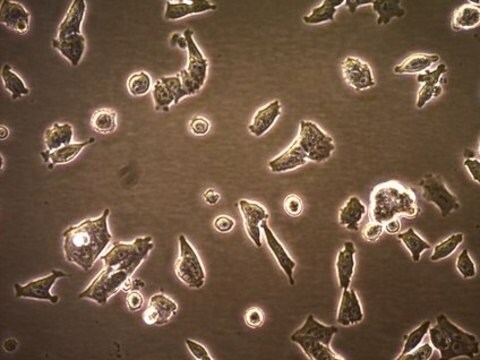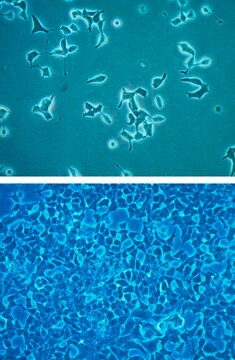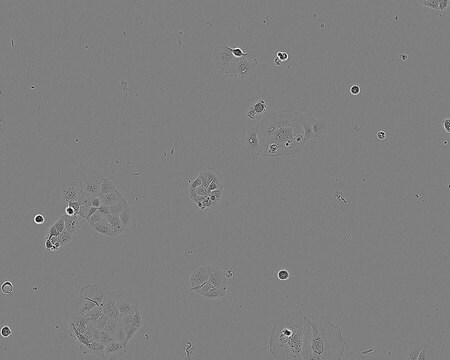LNCap Clone FGC Cell Line human
89110211, human prostate (carcinoma), Epithelial-like
Synonyme(s) :
LNCaP-FGC Cells
About This Item
Produits recommandés
Nom du produit
LNCap Clone FGC Cell Line human, from human prostate(carcinoma), 89110211
Source biologique
human prostate (carcinoma)
Mode de croissance
Adherent
Caryotype
Pseudodiploid male; seven marker chromosomes, modal number 46, range 33 to 91
Morphologie
Epithelial-like
Produits
Prostate acid phosphatase, prostate specific antigen
Récepteurs
Androgen, estrogen
Technique(s)
cell culture | mammalian: suitable
Maladie(s) pertinente(s)
metastasis
Conditions d'expédition
dry ice
Température de stockage
−196°C
Origine de la lignée cellulaire
Description de la lignée cellulaire
Application
- to study the effect of sex steroid hormones in regulating the expression of oligoadenylate synthetase 1 (OAS1)
- to study the role of curcumin and resveratrol in redox control and ability to promote apoptosis
- to investigate low molecular weight thiols present in the deproteinized extract of the cell line after derivatization
Milieu de culture
Procédure de repiquage
Autres remarques
Faites votre choix parmi les versions les plus récentes :
Certificats d'analyse (COA)
Désolés, nous n'avons pas de COA pour ce produit disponible en ligne pour le moment.
Si vous avez besoin d'assistance, veuillez contacter Service Clients
Déjà en possession de ce produit ?
Retrouvez la documentation relative aux produits que vous avez récemment achetés dans la Bibliothèque de documents.
Notre équipe de scientifiques dispose d'une expérience dans tous les secteurs de la recherche, notamment en sciences de la vie, science des matériaux, synthèse chimique, chromatographie, analyse et dans de nombreux autres domaines..
Contacter notre Service technique





